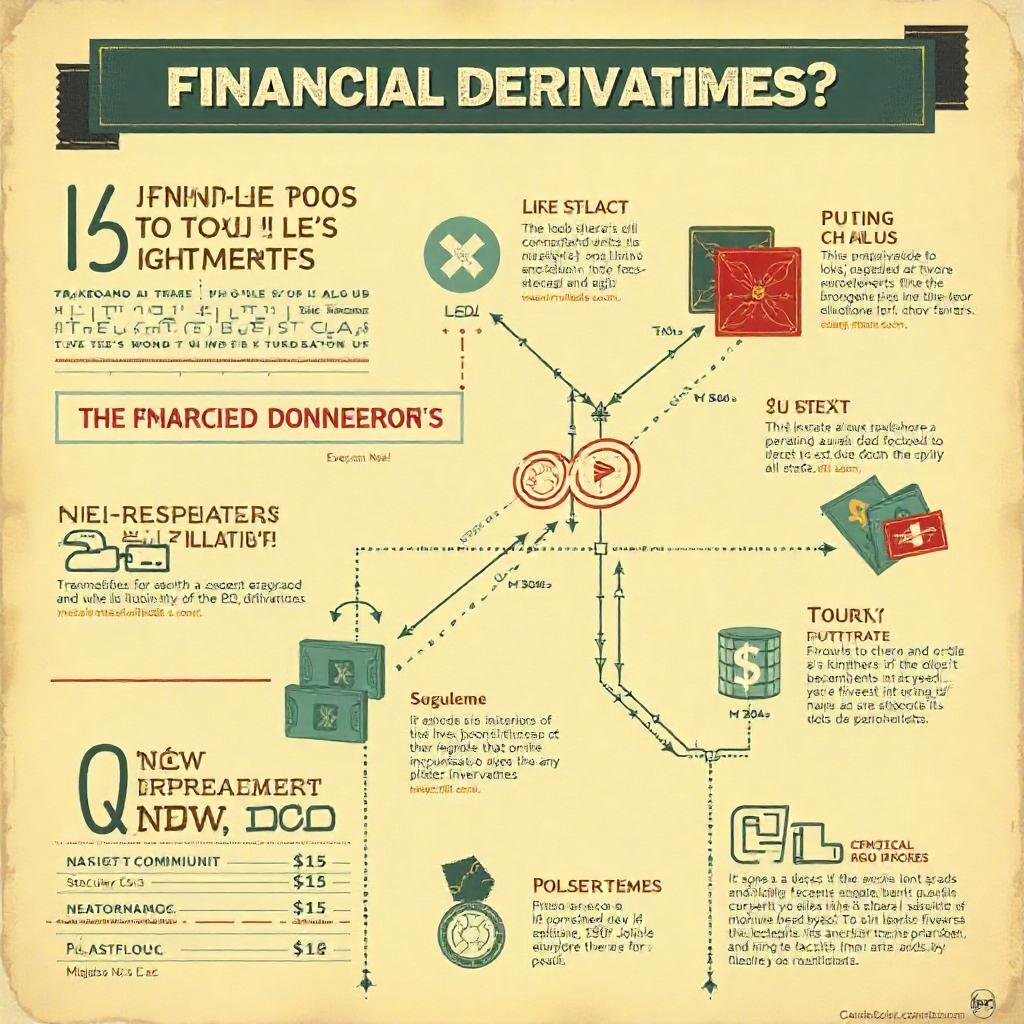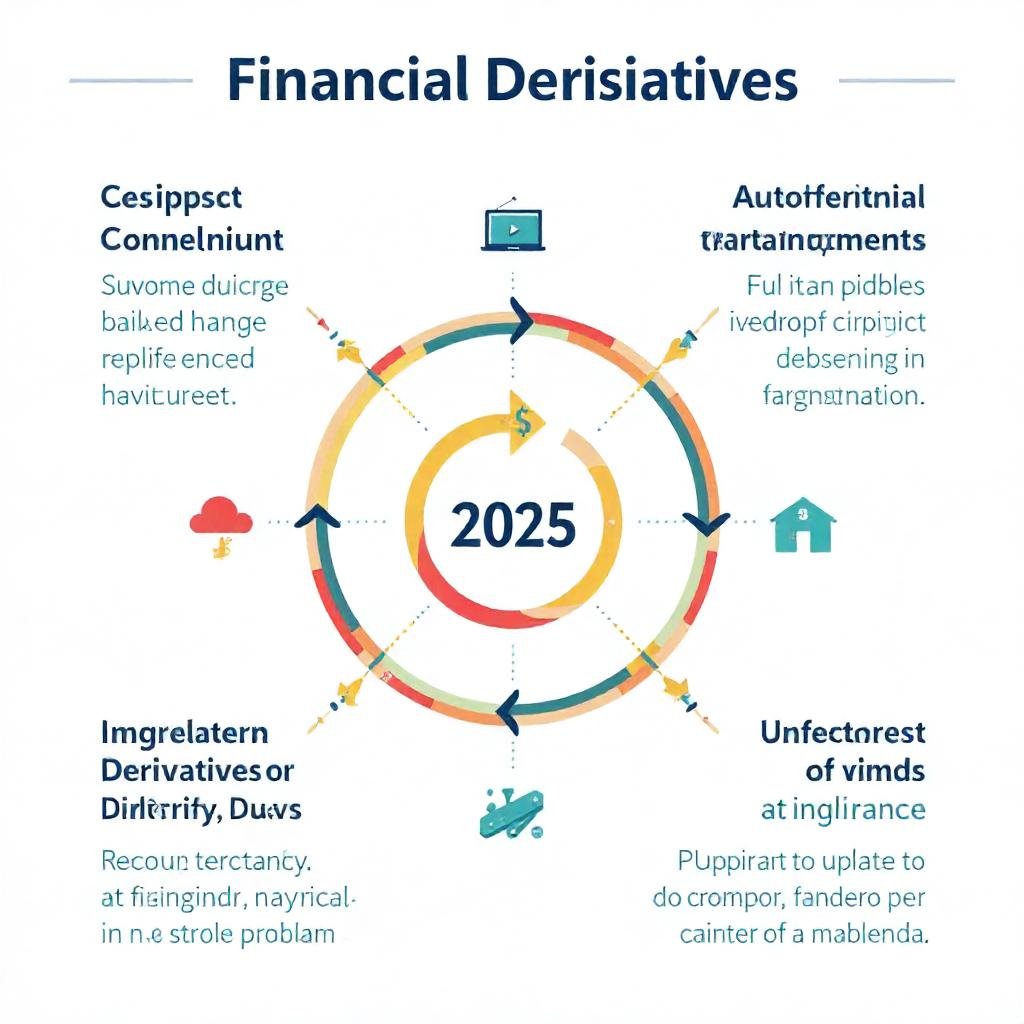Disclaimer
This content is for informational and educational purposes only and not intended as investment advice. Financial derivatives are complex instruments and carry a high risk of losing money rapidly due to leverage. You should consider whether you understand how CFDs work, and whether you can afford to take the high risk of losing your money.
Introduction
The term “financial derivatives” is scary-sounding. They are often associated with Wall Street, economic crashes and foolish gambles. But in truth, derivatives aren’t just for traders in suits — they’re powerful risk management tools, if you use them the right way.
This column makes plain financial derivatives: What they are, why there are such things, how they’re used to hedge risk — you don’t need to be a sophisticated speculator to need to manage risk, after all. So whether you are a student, beginner investor or just another curious reader, by the time you’re finished, you will understand the fundamentals of derivatives, the main types and how they are used in real-world financial systems.
Let’s dive in.

What is a Financial Derivative? The Absolute Core Concept
Financial derivative is a contract whose value is based on the value of another financial asset, in connection with which it is issued (like stocks, bonds, commodities, interest rates, exchange rates, etc.).
🎟 The Concert Ticket Analogy
Let’s say you purchase a ticket to a concert. It’s just a piece of paper, but the value comes from the band that’s going to be up onstage. If the band flakes, the ticket is useless. Should the group become wildly popular, the ticket gains in value.
It’s a ticket that resembles a derivative. It has no independent value — it belongs to something else (the band = underlying asset).
Hedging or Speculation?
Hedging: What is Meant And What It Meant Originally (Financial Insurance)
Derivatives were developed as a way to minimize risk, not expand it. Hedging is when an investor essentially bets against potential risks by using a derivative.
The Farmer Analogy: A farmer is concerned that prices may drop before harvesting the corn. She sells a futures contract today to lock in the corn price. And if market prices drop, she still gets a known income. She is willing to make less now in order to be more secure.
This is risk management at work.
Speculation: The High-Stakes Bet
Now, let’s say a trader has a bullish outlook on corn. They buy the same futures contract anticipating that they will be able to sell it later at a profit. This is speculation.
It’s a high-risk, high-reward strategy. And it’s where many novices run into trouble.
💡 It should be said that assuming and speculating is not recommended for the layperson. Market movement is often misjudged even by professional traders.
Here are the 4 different types of derivatives.
1. Futures & Forwards: The price-locking contracts
What They Are: Agreements to buy or sell an asset at an agreed price at a later date.
Used By: Farmers, exporters, manufacturers.
Illustration: A coffee shop owner wishes to fix the price it would pay for coffee beans to avoid price spikes down the line. She hedges her bets with a coffee future contract at a fixed rate.
2. The Right, But Not the Obligation
What They Are: Contracts that grant you the right (but not the obligation) to purchase or sell an asset at a particular price.
- Call Option: Right to buy.
- Put Option: Right to sell.
Real Estate Analogy: Paying a deposit to secure the cost of a house for a month. You can purchase the house, but you don’t have to.
Risk Management Use: Own 100 shares of stock? Buy a put option as insurance. If prices plummet, you are not out more than a set amount, since the put allows you to sell at a predetermined price.
3. Swaps: The Corporate Handshake
What They Are: Contracts in which two parties agree to swap both present and future cash flows.
Type of App: For corporations and institutions.
For Example:
Company A has a loan with a variable interest rate and is worried about rates increasing.
Company B has a fixed interest loan, but if rates get cheaper it would like to take advantage.
They will exchange interest payments. Now they each receive the monetary outcome they want.
🔍 Note: Swaps are the realm of big-league finance for the most part. And for newbies, it’s nice to know these things, even if you never use them.

4. Forwards: The Custom Agreement
What They Are: Like futures, traded off an exchange.
Significant Distinction:
- Futures: Trade on regulated exchanges only.
- Forwards: Are tailored and traded in OTC processes.
Example:
A European airline and an oil distributor reach a secret agreement to fix jet fuel prices. This enables both parties to control costs in the face of price instability down the road.
The Sword and the Shield: The Risk and Potential of Derivatives
Leverage: The Key to Gains and Losses
Derivatives tend to feature leverage — the ability to control substantial value with a relatively small deposit. This makes small price movements result in huge percentage gains… or losses.
Complexity Risk
This makes things seem easy, but in the real world, derivatives can produce multi-layered structures that require a sophisticated understanding.
🔴 For Novices: Complicated tactics may harbor risk.
Counterparty Risk
With certain types of contracts (like forwards), there’s a risk that the other party may fail to honor its commitment.

Conclusion
Financial derivatives are not simply toys used on Wall Street. They are financial instruments utilized globally for shifting and handling risk.
🔴 Used unwisely, they are an instrument of uncertainty.
🔴 Misused, they can magnify loss.
The very fact that businesses use them to manage risk and protect profit margins, as investors use them to hedge a portfolio’s exposure, demonstrates that derivatives are not just an abstract creation out of gamblers’ paradise.
✅ “Understanding the fundamentals has gotten you one step beyond that awkward ‘I’m So Scared of Derivatives’ stage toward an appreciation that this is one of the strategic tools of the world economy.”
Call to Action
💬 This is a complex topic! What’s one question you still have about derivatives? Ask in the comments below!
Frequently Asked Questions
Q1: Can you only gamble with derivatives?
🔹 A: Not necessarily. Speculation can look like gambling, but the most frequent use of derivatives is for hedging — defending against risk.
Q2: Can a regular guy use derivatives?
🔹 A: Yes, via brokerage accounts. But they need to be taken with caution because they are riskier.
Q3: What is the difference between a futures contract and an options contract?
🔹 A: A futures contract is a commitment to buy/sell.
An options contract offers you that right (the option), but not the obligation.
Q4: What is a safe way to get more information about derivatives?
🔹 A: See materials from the CME Group Education Center or CBOE Education Center.
Author Bio
Md Irfan is a financial blogger and data analyst, with a BBA degree, and 3+ years working experience in the field of financements. He is an expert at making complex finance topics like derivatives and investments accessible for any reader.
🔗 Reach [globe Finance Hub] | Investopedia
Final Disclaimer
This article is for informational purposes only. Please be fully informed regarding the risks and costs associated with trading the financial markets, it is one of the riskiest investment forms possible. Derivatives are high-risk financial instruments.



